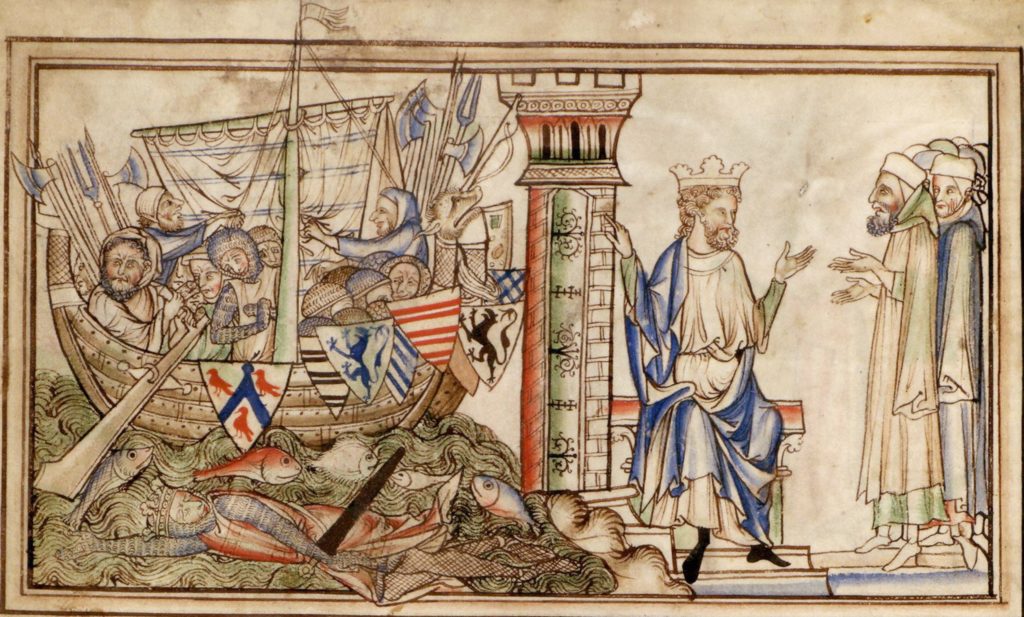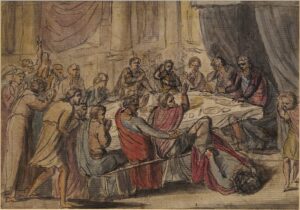
Earl Godwine may have had a humiliating experience finding himself exiled in the fall of 1051, but by many accounts his absence made the Saxons appreciate him like never before. King Edward the Confessor, ever more at home in Normandy than England, surrounded himself with Nobles and Prelates from his adopted land who proceeded to lord it over the Saxons as though they were a conquered people. Before the following winter was over, Godwine was encouraged by many requests for his return, and by summer he concluded that the time was right to reclaim his earldom.
Most likely he sent messages to Harold and Leofwine in Ireland, who finally set sail in nine borrowed ships loaded with mercenaries. Landing at Porlock in the Bristol channel for supplies, Harold met with fierce local resistance and a battle ensued that killed 30 Saxon thegns and their troops. Harold plundered the immediate area then boarded again, rounding Land’s end and heading for the Isle of Wight to meet up with his father.
Meanwhile, Godwine was headed across the Channel, keeping an eye out for the King’s fleet that he had been warned about. At the same time, one of those wicked Channel storms blew up, dispersed the Royal fleet and pushed Godwine back to Flanders. As it turned out, this was a lucky break because the King was unable to reassemble his ships and crews. So Edward’s undermanned fleet stayed in London while Godwine reunited with Harold and made his triumphant way up the Thames. Since Wessex was his own earldom, men flocked to his standard, and by the time he reached London at low tide and dropped anchor on the Southwark side, Godwine’s enthusiastic following had taken the spirit out of the King’s defenders. No one wanted a civil war just to support the overbearing Normans surrounding the King.
When the tide came in, Godwine’s party weighed anchor and traveled under London Bridge unopposed, making their way to Westminster where the King was waiting. Godwine sent messengers to Edward, asking him to return everything that had been taken from him and restore his rights legally. Hoping to find a way out of this mess, Edward prevaricated until Godwine’s followers became restive and the Earl had great difficulty keeping them under control. This was no good! Bishop Stigand finally came out and negotiated with his old friend; it was agreed that the King and the Earl of Wessex would meet at a great Witan Gemot the following day and restore peace.
As soon as the Normans saw which way the wind was blowing, they decided to make a run for it. I have this vision of Norman soldiers bursting out of the city in every direction, among them Archbishop Robert of Jumièges, Godwine’s bitter enemy. He and his followers were said to have cut their way through the crowd and out by the east gate of London, leaving a trail of dead and wounded victims. Worst of all, it appears that they abducted Godwine’s son and grandson, which might be the explanation why their departure was so violent; perhaps the Earl’s men were trying to stop the kidnapping. Alas for poor Godwine, the hostages given in good faith ended up as pawns in Duke William’s hands, and Godwine would never see his youngest son again.
Regardless, the great gathering was held the following day outside the walls of London, where the people and the other Earls gathered to welcome the return of their hero. Godwine laid his axe at the King’s feet and declared his homage, and while the crowd cheered their acclaim he and Edward exchanged the kiss of peace. Godwine was restored all that had been taken from him, the charges were put aside, and amnesty was declared for any ills that had taken place the last three months. Archbishop Robert was deprived of his post and declared outlaw. And lastly, “Good law was decreed for all folk” (Anglo-Saxon Chronicle).

Alas, Godwine was not destined to enjoy his triumph for long. The events had taken their toll on his health and he soon fell seriously ill. Within the year he was dead; while feasting at the King’s table he was seized by a powerful convulsion and fell insensible, never to waken again.
You can read more about this in GODWINE KINGMAKER.
Karen says:
Another strong man dies of convulsions while feasting? Again Edward is present? Perhaps the kiss of peace was not so peaceful for Edward, a king forced by a mere earl to change his preferred men of court, his very daily life from that which he found most enjoyable? Wouldnt Edward be continuallly reminded of it every waking hour simply because his friends were no longer there? Wouldn’t that be extremely humiliating to a king?
Could Edward have bided his time waiting to take his revenge at a moment least expected, when the supporters of the Earl would be less suspicious of
it? It seems an awful lot of nobles died suddenly, though young and strong in those days, no? Death by convulsion at feasting time must have been a no. #1 killer back then.
Mercedes Rochelle says:
oooohhh, you are so wicked! The pious Edward??? Actually, since Godwine had been ailing for some time (ever since he learned about the death of his eldest), foul play was apparently not suspected.
Karen says:
Laughing…not really wicked, it is just that I read all of the posts in one sitting. That’s how I noticed that at least two died, while feasting, of convulsions, and in both cases Edward was there and stood to gain. In one case a crown, in another case revenge. These days we are more cynical and we have forensics. Also we don’t generally have to be as afraid to voice suspicions.;)
Mercedes Rochelle says:
So true! It was an interesting concept!